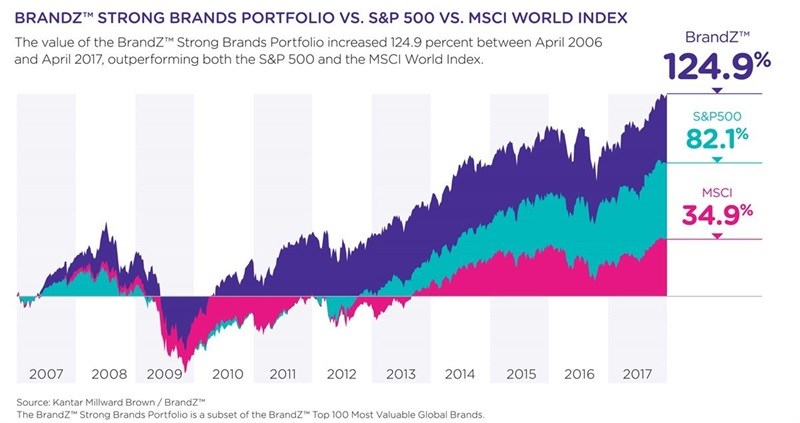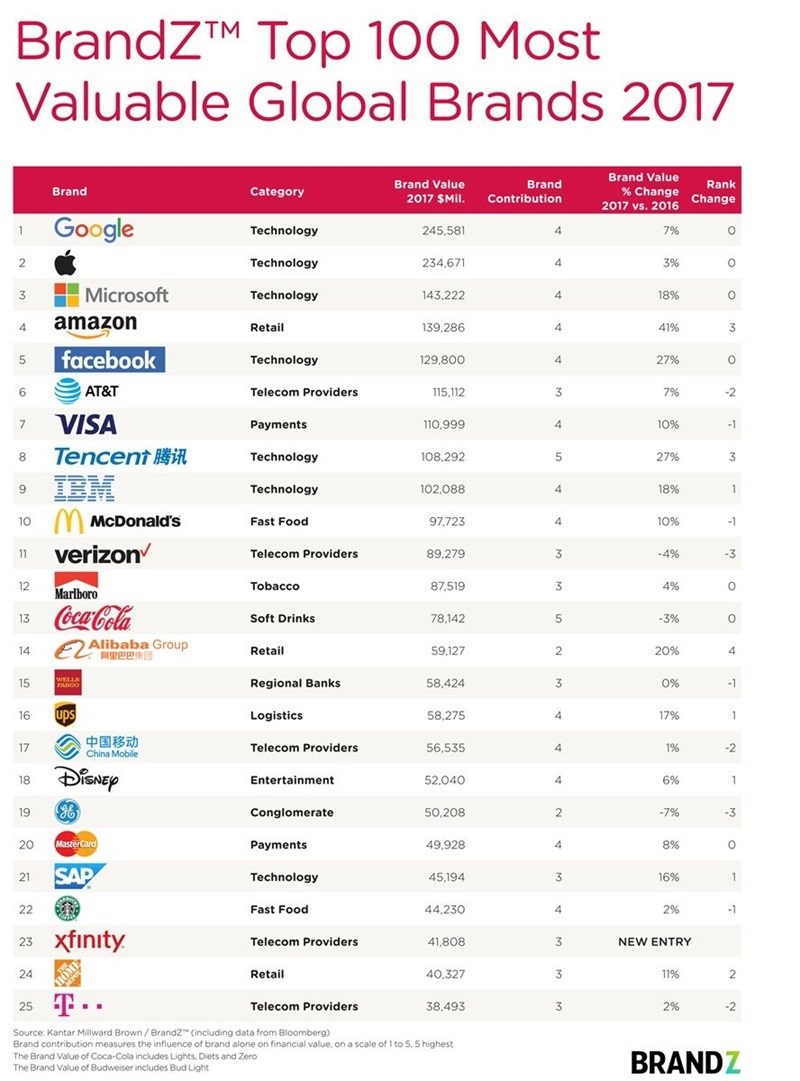
Related


Patrice Motsepe announces Harmony Gold's "huge investment"
Colleen Goko and Nqobile Dludla 20 Nov 2025




Top stories






More news


Marketing & Media
Ads are coming to AI. Does that really have to be such a bad thing?













Amazon achieved the highest dollar value growth of all brands in the Top 100 ranking, increasing by $40.3bn (+41%) to $139.3bn to take the no. 4 position. The retail giant has continued to focus on its technology ecosystem honed to meet multiple consumer needs such as online shopping, rapid delivery and entertainment, as well as introducing new artificial intelligence-enabled services including grocery delivery and personal assistant Alexa.
Google, Apple and Microsoft retain the top three positions, growing their brand value +7% to $245.6bn, +3% to $234.7bn and +18% to $143.2bn respectively over the past year, while Facebook, at no. 5, grew +27% to $129.8bn. 25% of the total value of the BrandZ Top 100 Most Valuable Global Brands is made up of the combined brand value of the Top 5, emphasising their dominant positions in the modern business landscape.
David Roth, CEO EMEA and Asia, The Store WPP, says: “This year’s BrandZ global top 100 continues to demonstrate that strong brands deliver superior shareholder value and returns regardless of disruptive external climates. Dubbed the ‘The Frightful Five’ by some, the tech giants that head the rankings are more like the ‘Fearsome Five’ to their competitors, given their huge brand power and a seemingly unassailable market position.”
Other highlights in this year’s ranking include Chinese brand Tencent (no.8), which saw increased use of its social platform WeChat and entered the Top 10 for the first time, with a brand value increase of +27% to $108.3bn. Adidas was the fastest riser by percentage growth (+58%, $8.3bn), followed by Chinese premium alcohol brand Moutai (+48%, $17bn).
As the largest and definitive brand-building platform in the world, BrandZ reflects the brands that are integrated into today’s consumer lifestyles. It is the only brand valuation study to combine interviews with over three million consumers globally with analysis of the financial and business performance of each company (using data from Bloomberg and Kantar Worldpanel).
This year, the total brand value of the Top 100 brands has risen +8% to $3.64tn, compared with +3% in 2016, while the number of brands worth more than $100bn has increased from six to nine. The total brand value of the ranking is up +152% from 2006 (its first year), as its composition has shifted towards innovative, consumer-focused technology brands with huge reach and brand-building power. The BrandZ Top 10 in 2017 are worth almost as much as the entire Top 100 in 2006 ($1.42tn vs $1.44tn), and have grown +249% in value, compared with +152% for the Top 100 as a whole.
The value of the BrandZ Top 100 Global Brands confirms that strong brands continue to outperform their competitors. Compared against key benchmarks over the past 12 years, the portfolio of BrandZ Top 100 brands grew 50% more in value than the S&P 500 and 3.5 times the MSCI All Country World Index.

The 2017 ranking shows that the balance of power has truly tipped towards the consumer-focused technology brands that develop ecosystems that cater to many needs, simplifying an increasingly complex world. More than half of the Top 100’s total brand value is contributed by technology-related brands (a definition that includes telecoms and online retailers), up from a third in 2006, and these have grown +16% in the last year compared with +4% for non-tech brands.
Nine of the Top 10 are technology-related brands, as are all seven of the newcomers to the Top 100 in 2017: XFinity, YouTube, Hewlett Packard Enterprise, Salesforce, Netflix, Snapchat and Sprint.
Retail was the fastest rising category, increasing +14% in value over the last 12 months, driven by ecommerce brands such as Amazon and Alibaba which, like many native internet companies, continued to add physical stores to their sales channels. Overall the value growth of pure online retailers has increased +388% since 2006, while traditional retailers dropped -23% as they took longer to adapt their offering to include online. The technology category grew +13%, while fast food was this year’s third highest growing category (+7%), as the leading brands introduced fresh food and value menus as well as customer touchpoints innovations that enhance the brand experience.

In terms of regions, US brands dominate the ranking, with 54 brands in the BrandZ Top 100, worth 71% of the total brand value. In the last year these brands have grown +12% compared with an overall -1% decline for brands with origins in the rest of the world except China where overall brand growth, excluding state-owned enterprises, was +11%.
The top 20 B2B brands increased their value by 11%. Microsoft remains at no. 1 growing +10% to $143.2bn, while Shell is the fastest B2B riser, increasing +23% to $18.3bn. The ranking also shows that as the digital world creates overlap between business and consumer environments, the border between B2B and B2C is disappearing, creating B2H (Business to Human) brands.
Key trends highlighted in this year’s BrandZ Global Top 100 study include:
Doreen Wang, Kantar Millward Brown’s Global Head of BrandZ, comments: “This is the era of internet giants that have developed ever-growing ecosystems that touch and connect consumers, with the overall aim of making life easier, simpler and better. Technology with the consumer at its centre has redefined our expectations, and we now take for granted that products, services, tools and content are immediately available at our fingertips. These brands also demonstrate great elasticity – they confidently and comfortably play in new territories and new categories to develop and expand their customer bases.”
The BrandZ Top 100 Most Valuable Global Brands report and rankings, and a great deal more brand insight for key regions of the world and 14 market sectors, are available online here. The Global report, rankings, charts, articles and more can also be found via the BrandZ app. The BrandZ app also contains the same features and functionality for all BrandZ regional reports and is free to download for Apple IOS and all Android devices from www.brandz.com/mobile or search for BrandZ in the respective iTunes or Google Play app stores.